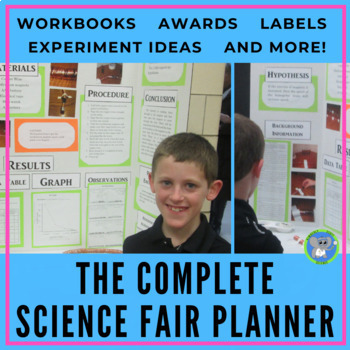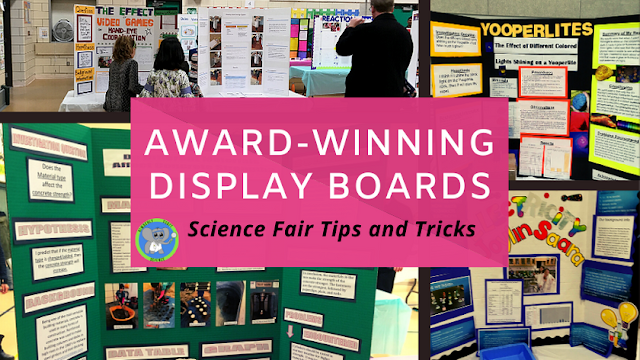Family Science Fair Project Planning Workshop | Ideas And Tips For Coordinators
A science fair is a learning experience that helps students think like scientists. As the science fair coordinator, you should assist the students and parents. We recommend having a science fair workshop to help calm the parents' nerves. The goal is for students and parents to leave feeling like, "We can do this!"
1. To reassure the parents. The kids are 100% in, but the parents may be nervous about what is expected. A good science fair is age-appropriate.
2. Excite the kids and the parents. Perform an experiment that is engaging, simple, and inexpensive. It should follow the format of a science fair project. This will give the families a chance to see the expectations.
3. Show the kids how to come up with an original idea. You want them to leave with a possible idea and feeling confident. We love the four-question strategy. See the link at the end of the blog.
4. Families should leave with resources to help them start their project. The packet should contain the parts of the investigation, the layout for the board, sample judging forms, a blank science journal, and links to great sites.
5. Provide some time for families to look through science books for ideas. Most kids will already know what they want to do, but a few need to narrow their ideas. Make sure to have a volunteer on hand to make copies for the families.
Family Science Fair Workshop Sample Schedule
Here is the format I follow for my workshop. The key is to provide a hands-on investigation. Each family conducts the experiment with the journal for their child's grade level. We usually have two sessions: K-2nd and 3rd-5th grade.
1. Sign in Table
At the sign-in table, have the resource packet and experiment for students to pick up. Remember to have pencils available. While families wait for everyone to settle in, they can look through the packet.
2. Introduction
Welcome everyone to the workshop. Ask the following questions:
- Who has done the fair before?
- Who is nervous about doing the fair? (Many parents will raise their hands for this question.)
- Explain that the goal of the fair is to make it age-appropriate. First, we will start by conducting a simple investigation. Have them work together as a family. Explain that this investigation is in the same format as a science fair project.
3. Perform the Investigation
- Choose an investigation that follows the scientific method and follows the expectations for your fair.
- The investigation should use simple supplies and not be too complicated. It needs to be something the families can complete in 30 minutes or less.
- Since they have a parent to help them, I give a brief explanation and then let them get started. I then roam around the room, giving feedback and answering questions.
We like to perform "Dangling Ice" with families. This one has clear variables and expands nicely with the grade levels. Our families always get great results.
I also like it because I can do the experiment with about 50 kids for under $5.00. It really shows families how simple an experiment can be while producing fun results. It is entertaining to watch the families working together.
- After the investigation, we gather as a group and use the experiment to discuss the expectations for the fair.
- I make sure to talk about the expectations for that grade level. They change one thing and measure the effects of that change. A kindergarten project only has one level of change, while a 5th-grade project would have three levels, for example, K=hot/cold and 5th=Hot/Room Temperature/Cold.
- Explain how inexpensive the Dangling Ice experiment was. We do not expect you to spend lots of money.
- Go through the packet for your fair. Explain the parts.
- Explain that we understand that kids all have different attention spans. A kindergarten project is much different than a 5th-grade project. It should be different.
Did you know you can create a unique investigation with just 4 questions?
Bring the students up to the front of the room (or have them work with their parents). Using a whiteboard, write the following questions. I like using baking cookies as an example. It shows something they are familiar with and something parents can also relate to.
1. What do cookies do? How do cookies act?
2. What supplies do I need to do an experiment on cookies?
3. How can I change the supplies I use for baking cookies?
4. What can I measure about the cookies? This is the toughest question for kids. Remind them to think about what they would measure after baking them to know what might be different. Height, taste, texture, weight, mass.
After answering the questions, we choose one supply to change and one thing to measure. We then take those and turn them into a testable question. This will be our science fair question. It is good to show them you can develop multiple experiments, but for the fair, you are only doing one. If siblings participate, both could make cookies but test different things.
Examples
Does the amount of baking soda affect the size of a cookie?
Does the brand of flour affect the texture of a cookie?
What is the effect of the type of cookie sheet on the hardness of a cookie?
6. Provide time for questions or work time to develop a project with the four-question strategy.
Provide a blank page of the Four Question Strategy. At the end of the workshop, they can fill it out and leave with an idea. We also recommend saving past projects. Families like to look at those for ideas.
We hope you have a wonderful workshop and a successful fair.
SHOP THIS POST
We have done the work for you with our science fair workbooks, judging forms, experiments, and more. Click the link to see everything included.
By purchasing the bundle, you will SAVE 20% on each resource.







